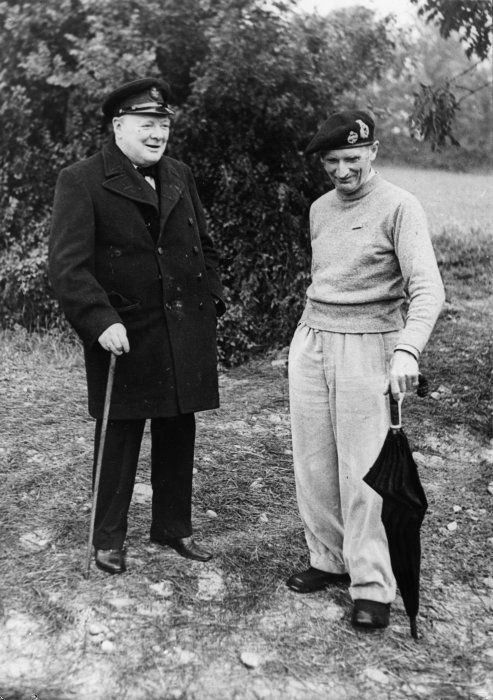However beautiful the strategy, you should occasionally look at the results. – Winston Churchill

I can imagine this quote being about the meticulous & detailed planner from WW2, Field Marshal Bernard "Monty" Montgomery, whom Churchill once said was "Indomitable in retreat, invincible in advance, insufferable in victory."
What does that mean?
It means that you need to check your results regularly! Even the best laid plans, with all probable contingencies accounted for, can go pear-shaped in the blink of an eye. In fact, it’s been that way for so long, there’s a poem from 1786 that says that the best laid plans of mice and men often go awry (wrong).
The quote simply implores us to check the results we are getting in the real world, not just assume the results will be according to the textbook. There are always unexpected factors, and everyone’s favorite, the unintended consequence. To quote an old Russian proverb, “Trust, but verify.” Trust your plan will work, but check on it, just to be sure.
Why is feedback important?
Feedback is a scientific term for checking your results. It also has the implication that you will use the information gathered to adjust the strategy, and get things back on track. I don’t even want to think about all the times I had a so-called “beautiful strategy,” only to have it crash and burn or otherwise go horribly wrong.
Feedback helps us see that things aren’t going exactly as planned. This foreknowledge allows us to either adjust the strategy, or abandon it in favor of PlanB (or PlanC or…) as appropriate. Feedback is, in my opinion, a necessary part of success. You might get lucky every once in a while, but if you want regular success, you need to check your results. Frequently.
Where can I apply this in my life?
For me, chemistry was always a bit of a struggle. I understood the concepts, but often messed up the execution (the lab work). Cooking is just another word for a chemistry lab, and my attempts at cooking have rarely been any better than my lab work in school.
I’ve tried making fudge and other things related to chocolate (my favorite food group), but something always seems to go wrong. The strategy (or recipe) is beautiful, verified in kitchens across the country, and perhaps, the planet. However, as I examine the results, something always seems to be wrong. I’m sure it’s a matter of ‘touch,’ or experience, but it’s still frustrating.
What have you been doing in your life? How often do you look at the feedback? If you’re in a relationship, how often do you check the results? Is there something you have done, or failed to do, that has the other person annoyed? If you don’t pay attention to the feedback, it could get ugly, right?
Grab some paper and write down a couple times when you have used feedback in your recent past, and things went well. Either you noticed a problem before it got really big, or you monitor the feedback on such a frequent basis that things never get a chance to go too badly wrong.
Now write down a couple of things that went poorly, and that, in retrospect, gave you clues that it was going to crash. Also write down details about the clues. What might you have done differently to take advantage of them? Also write down how you think things might have turned out differently if you had been paying closer attention to the results.
If that wasn’t enough, write down a few categories of life that you are prone to have problems with, and need to check the results more frequently. For me, cooking is the top of the list, followed by relationships. Relationships is second only because I’ve been paying closer attention on a more regular basis.
By now, you should have a few things written down. Take some time to examine what you do when you review results and act on the feedback. Then examine what you do when things don’t work out as well. Look for patterns within each group. Is there something common in one group that is lacking in the other? Perhaps that’s a clue, and you might consider how things would be different if you applied that ‘thing’ to the other group.
Everyone is different, so you will have to come up with your own plans, strategies, and methods. For things that you have difficulty with, try looking at the results more frequently, and making larger corrections each time. You might even ask a friend or two how often they check the feedback when they are the thing you’re struggling with. It might help, right?
Do you pay closer attention to certain aspects of your life, while ignoring feedback in others? I believe my attention at work, but lack of it at home, was a contributing factor to my divorce with my first wife. I learned that lesson the hard way. Could you learn from my mistake?
Things change. No plan or strategy can anticipate all the possible changes. So you must go with your best possible plan, and look at the results from time to time. How often? That depends, and will likely vary quite a bit. It’s an experience thing, ‘touch’ if you prefer. The only way to get experience is to do it. So get busy!
From: Twitter, @QuoteHouse
confirmed at : http://www.brainyquote.com/quotes/quotes/w/winstonchu135256.html
Photoby Unknown (Prime Minister Winston Churchill and Field Marshal Bernard Montgomery, ca 1941)






